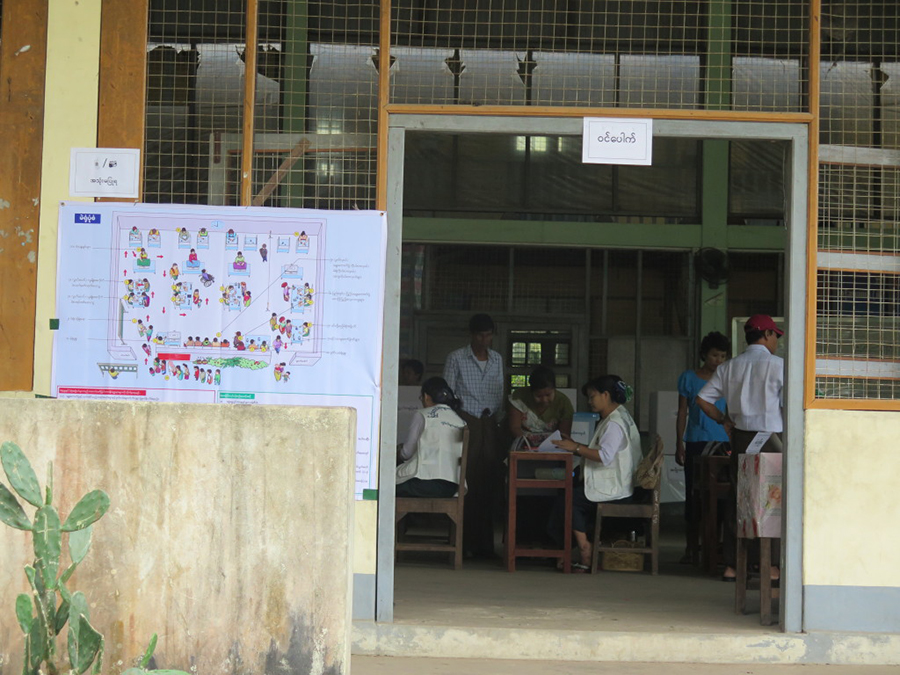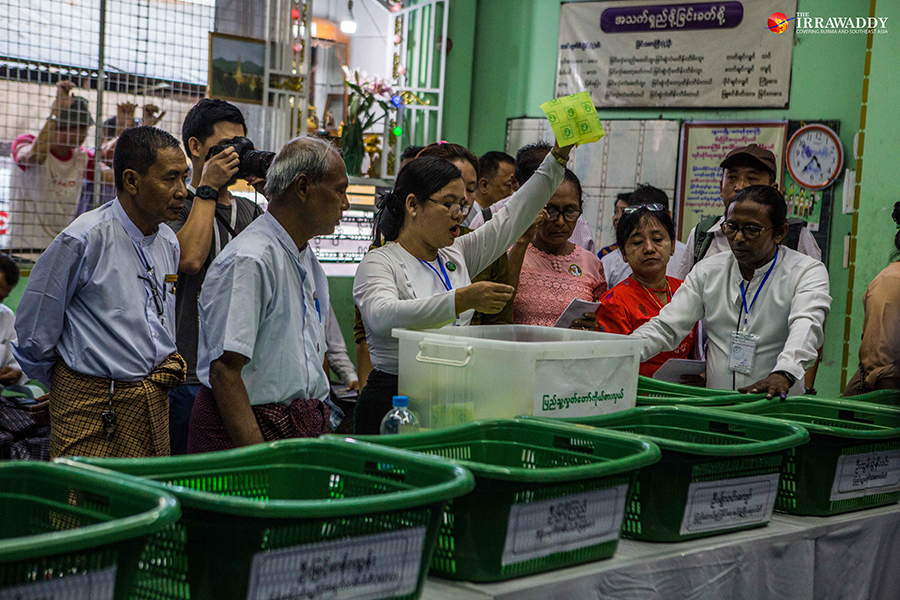YANGON—Myanmar’s ruling National League for Democracy (NLD) party has said it objects to placing polling stations for the upcoming 2020 election in military cantonments, claiming this would infringe on military voters’ freedom to vote.
Since the 2010 general election, military personnel and their family members in many constituencies have been ordered to vote in military cantonments, under the watch of their superiors. Monitoring of polling stations inside military compounds and the areas where military personnel live is also limited for security reasons.
Myanmar also held a general election in 2015 and three by-elections in 2012, 2017 and 2018.
Some political parties and analysts have said members of the military were intimidated into voting for the party that their superiors supported. In some cases, members of the military had their votes directly controlled by their superiors: they received ballots that were already filled out or their superiors voted on their behalf.
NLD Central Executive Committee member U Nyan Win told the media in late September that the party made similar objections to polling stations in military cantonments in previous elections.
“We want all to be fair. Regarding the military votes, we disagree with placing polling stations inside barracks,” he told reporters. He added that the NLD is going to ask to review electoral laws for possible changes ahead of next year’s election.
Under the current electoral law, 300 voters are permitted to vote at each polling station.
Military spokesperson Major General Tun Tun Nyi responded to the NLD’s objection, saying that members of the military and their families need to vote inside the barracks as they are too busy to go outside.

“We are on duty 24 hours per day. It is difficult for both military personnel and their family members to go vote outside,” he told reporters during a military press conference in Naypyitaw last week.
Just before the 2015 general election, military chief Senior General Min Aung Hlaing cautioned military personnel and their families to vote for the correct candidates: those with political, economic and security stances sympathetic to the military, who can protect “race and religion” and fend off foreign influence.
His speech didn’t mention specific candidates but many believed it was a warning to members of the military not to vote for the NLD: NLD chairwoman Daw Aung San Suu Kyi was married to a British national.
Myanmar’s military has an estimated 500,000 personnel. With the addition of family members, over 1 million people out of an estimated 32 million eligible voters in the 2015 election were affiliated with the military. The Irrawaddy has asked the Union Election Commission (UEC) for information regarding the number of military polling stations, including the number of eligible voters and results from past elections, but the election body said the data weren’t available as the UEC was reviewing them.
U Ye Tun, a former Lower House lawmaker with the Shan Nationalities Democratic Party, said that in previous elections, the military-backed Union Solidarity and Development Party (USDP) won in a landslide at military cantonment polling stations, while other parties saw very few votes.
The former lawmaker said there is no way that military-affiliated voters can vote freely for the candidates they support because they are being watched by their commanders.
NLD Central Information Unit Secretary Monywa Aung Shin has also pointed to problems with military polling stations in the by-elections in 2017 and 2018, particularly in Kachin and Shan states and in the Sagaing Region township of Tamu.
“We saw just one vote [for the NLD] or none at all from the polling stations inside military compounds. We need to consider whether the results were legitimate and whether people were able to vote freely,” he said.

Monywa Aung Shin said the NLD will demand that the commission ensure every voter is able to cast their vote freely and that military personnel be allowed to cast their votes in nearby civilian polling stations where they aren’t influenced by their superiors.
But a local election monitoring group, which requested to remain anonymous, has said that if military voters are being intimidated into voting for a specific party, it won’t matter where the polling stations are placed.
A member of the group said that they observed some polling stations in military cantonments during the 2015 general election and observers were allowed to check for fraud and irregularities, but the observations were only conducted on election day.
Observers have also voiced concerns about members of the military voting in advance, outside their assigned constituency. An election observer told The Irrawaddy that while advanced voting is hard to monitor, advanced voting by the military is even less transparent, as voters send ballots from military bases. The election monitoring group said that the UEC needs to develop clear procedures and regulations for advanced voting.
US-based nonprofit the Carter Center said in its final report on the 2015 election that despite its recommendations, the UEC “did not publish information about the number of [advanced voting] requests, voting locations, or the schedule for polling” for within-constituency or for out-of-constituency voting.
Observers and party representatives were not permitted to observe the casting of ballots during out-of-constituency military advance voting, the Carter Center report noted. The report added that because of this, observers couldn’t assess whether ballots were cast in secret, without intimidation and by the actual voters themselves.
The Shan Nationalities League for Democracy (SNLD), one of the country’s most popular ethnic political parties, said it raises objections about placing polling stations in military cantonments whenever it meets with the UEC, as the process lacks transparency.
According to local media reports, the UEC said it would negotiate with the military on the voting process for military personnel and their families to ensure free voting and open access to the polling stations.
Sai Leik, general secretary of the SNLD, questioned whether members of the military need to cast votes, as their representatives are already allocated 25 percent of the seats in Parliament under the 2008 Constitution.
“Public opinion should be sought as to whether the military needs to cast votes, as they’ve already reserved 25 percent of the seats in Parliament. If the public were to say no, the military would need to accept it,” he said.
You may also like these stories:
NLD Dominates Yangon Municipal Election; USDP Routed
Myanmar’s Opposition Threatens Action Over Pro-NLD Campaign Stickers
NLD Celebrates 31st Anniversary, Says Myanmar’s Democracy Not Yet ‘Genuine’
NLD Have Constitution to Thank for Current Position: Myanmar Military Lawmaker
Myanmar Ruling Party Suspends Chief Research Officer for ‘Overstepping Authority’

















